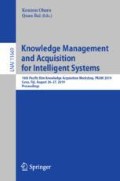Abstract
Cognitive models for human reasoning are often specialized and domain-specific. So the question whether human reasoning across domains shares the same (or at least a similar) mental representation and inference mechanism is still an unexplored territory, as is the endeavor to create cognitive computational models for multiple domains of human reasoning. In this paper, we consider the theory of mental models for conditionals as a test-case and aim to extend it towards syllogistic reasoning using a formal translation. The performance of this new cross-domain theory is comparable to the performance of state-of-the-art domain-specific theories. Potentials and limitations are discussed.
Access this chapter
Tax calculation will be finalised at checkout
Purchases are for personal use only
Notes
- 1.
In the original model by Oberauer [12], the parameter \(1 - r\) describes the probability that an individual will not reason, but guess. In our implementation of the model we do not use guessing.
- 2.
As discussed by Johnson-Laird, no iconic model can show that it represents an entire set, we have no way of knowing whether a model describes the whole set, or just a small number of entities that belong to it [5].
- 3.
From now on we use a compressed version of the models representing sets of the same entity, i.e., one unique entity only, as we do not consider quantifiers like “Most”.
- 4.
References
Bara, B.G., Bucciarelli, M., Lombardo, V.: Model theory of deduction: a unified computational approach. Cogn. Sci. 25(6), 839–901 (2001)
Bucciarelli, M., Johnson-Laird, P.N.: Strategies in syllogistic reasoning. Cogn. Sci. 23(3), 247–303 (1999)
Byrne, R.M., Johnson-Laird, P.N.: Spatial reasoning. J. Mem. Lang. 28(5), 564–575 (1989)
Evans, J.S.B., Over, D.E.: If: Supposition, Pragmatics, and Dual Processes. Oxford Cognitive Science, Oxford (2004)
Johnson-Laird, P.N.: How We Reason, 1st edn. Oxford University Press, Oxford (2006)
Johnson-Laird, P.N.: Mental models in cognitive science. Cogn. Sci. 4(1), 71–115 (1980)
Johnson-Laird, P.N.: Mental models and human reasoning. Proc. Nat. Acad. Sci. 107(43), 18243–18250 (2010)
Johnson-Laird, P.N., Byrne, R.M.: Conditionals: a theory of meaning, pragmatics, and inference. Psychol. Rev. 109(4), 646–678 (2002)
Khemlani, S., Johnson-Laird, P.N.: Theories of the syllogism: a meta-analysis. Psychol. Bull. 138(3), 427–458 (2012)
Oaksford, M., Chater, N.: A rational analysis of the selection task as optimal data selection. Psychol. Rev. 101(4), 608 (1994)
Oaksford, M., Chater, N., Larkin, J.: Probabilities and polarity biases in conditional inference. J. Exp. Psychol. Learn. Mem. Cogn. 26(4), 883 (2000)
Oberauer, K.: Reasoning with conditionals: a test of formal models of four theories. Cogn. Psychol. 53(3), 238–283 (2006)
Polk, T.A., Newell, A.: Deduction as verbal reasoning. Psychol. Rev. 102(3), 533 (1995)
Ragni, M., Kola, I., Johnson-Laird, P.N.: On selecting evidence to test hypotheses: a theory of selection tasks. Psychol. Bull. 144(8), 779 (2018)
Revlis, R.: Two models of syllogistic reasoning: feature selection and conversion. J. Verbal Learn. Verbal Behav. 14(2), 180–195 (1975)
Rips, L.J.: The Psychology of Proof: Deductive Reasoning in Human Thinking. MIT Press, Cambridge (1994)
Sells, S.B.: The Atmosphere Effect: an Experimental Study of Reasoning. Archives of Psychology. (Columbia University), New York (1936)
Acknowledgments
This paper was supported by DFG grants RA 1934/3-1, RA 1934/2-1 and RA 1934/4-1 to MR. We are also grateful to Lukas Elflein for helpful comments.
Author information
Authors and Affiliations
Corresponding author
Editor information
Editors and Affiliations
Rights and permissions
Copyright information
© 2019 Springer Nature Switzerland AG
About this paper
Cite this paper
Todorovikj, S., Friemann, P., Ragni, M. (2019). A Cross-Domain Theory of Mental Models. In: Ohara, K., Bai, Q. (eds) Knowledge Management and Acquisition for Intelligent Systems. PKAW 2019. Lecture Notes in Computer Science(), vol 11669. Springer, Cham. https://doi.org/10.1007/978-3-030-30639-7_16
Download citation
DOI: https://doi.org/10.1007/978-3-030-30639-7_16
Published:
Publisher Name: Springer, Cham
Print ISBN: 978-3-030-30638-0
Online ISBN: 978-3-030-30639-7
eBook Packages: Computer ScienceComputer Science (R0)

